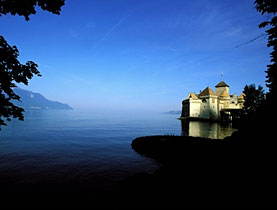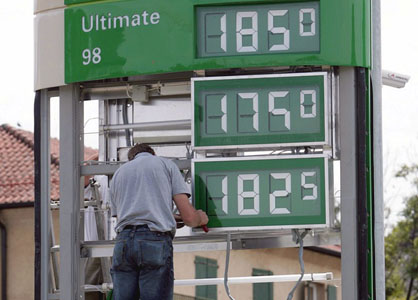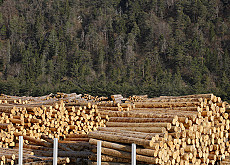Prospecting for gas and oil in Lake Geneva

Lake Geneva and the Jura mountains may soon be reverberating with sounds of drills and pumps as small prospectors try to take advantage of spiralling energy prices.
This year Swiss firm Petrosvibri hopes to start drilling for gas deep beneath the lake’s crystal-clear waters opposite Montreux’s Chillon Castle. And French specialist oil companies are eager to begin looking for oil close to Geneva.
With fossil fuel prices shooting through the roof – oil and gas have more than doubled since 2002 and 1999, respectively – specialist niche outfits are now taking another look at investments in regions such as Lake Geneva, Jura, Lake Biel and Zurich.
“There’s a lot of activity at the moment. At current prices, even more complicated [extraction] techniques are profitable. Everyone wants to get involved,” geologist Werner Leu told swissinfo.
Using new computer models, Petrosvibri, the Vevey-based firm that belongs to Swiss gas providers Holdigaz and Gaznat, has re-examined geological research and data of Lake Geneva from the 1980s.
It claims that billions of cubic metres of gas – and perhaps crude oil – may be stored several kilometres down at the eastern end of the lake close to where the River Rhône flows into it.
Philippe Petitpierre, president of Petrosvibri, said that even with a ten to 15 per cent chance of success, it was worth investing about SFr20 million ($18.1 million) in the study phase, rising to SFr300-400 million for the actual extraction.
“We could come across around 40 billion cubic metres of gas – more than ten times the annual consumption of the country,” he told Le Temps newspaper.
Strike it rich
Geologist Urs Eichenberger from Lausanne University acknowledged that Petrosvibri could well hit the jackpot under the lake.
“The Lake Geneva region is under the frontal part of the Alps…and under the upper part of the lake a “large up-turned teacup’-like structure has been identified where gas could accumulate,” Eichenberger told swissinfo.
It’s a high-risk bet, but at current prices it can become interesting, he added.
Petrosvibri is currently planning the drilling phase and is finalising an environmental impact study ahead of possible appeals by local residents. If all goes well, it hopes to start drilling at the end of 2008.
At the other end of the lake, Toreador Energy France, which belongs to the Texan oil company Toreador Resources Corporation, is also planning projects searching for crude oil deep below the surface between Nantua, west of Geneva, and the Vallée du Joux in the Jura mountains.
Ambitious
The French company, with an annual turnover of SFr30 million, is tiny compared with oil giant Total, worth SFr250 billion. But Toreador is ambitious, and if oil prices stay at current levels, the company has great hopes for its plans in the Lake Geneva region.
Despite corporate enthusiasm, there is still concern about the impact on Lake Geneva’s pristine alpine setting. But Petitpierre downplays this.
“The drilling will take place from the lakeshore – close to the mouth of the Rhône, but far from the protected areas. Tubes, drills and other telescopic devices will reach the layers without damaging the lake fauna or flora. It will all take place some two to four kilometres deep. Invisible and discrete – like gas,” he explained to Le Temps.
He added that while the future may lie with renewable energy, gas would provide an interim supply when oil begins to dry up.
But Greenpeace Switzerland dismissed the quest for gas as “nonsensical” and “an energy of the past”.
“Rather than investing huge amounts in fossil fuels with a short-term vision of making money it is much better to consider renewable energies,” said Nicolas de Roten, spokesman of the environmental organisation.
swissinfo, Simon Bradley in Geneva
In Switzerland total energy use can be divided into three roughly equal parts: households, transport and industry-services.
Crude oil makes up 57% of Switzerland’s energy sources, followed by hydroelectric (14%), gas (12%) and atomic energy (10%).
In 2004, Switzerland imported 12.66 million tons of crude oil. The demand for crude oil is expected to increase worldwide by 40%.
Biggest natural gas reserves: Russia (31.9%), Middle East (40.5%), Asia and Oceania (8.2%), Africa (7.8%), North America (4.4%), South and Central America (3.8%) and Europe (3.4%) – (SwissOil figures).
Experts say natural gas reserves are expected to last between 80 to 130 years, while crude oil may run out in 50 years.

In compliance with the JTI standards
More: SWI swissinfo.ch certified by the Journalism Trust Initiative




You can find an overview of ongoing debates with our journalists here. Please join us!
If you want to start a conversation about a topic raised in this article or want to report factual errors, email us at english@swissinfo.ch.